北师大版(2019)必修第三册Unit7 Art Lesson2 Beijing Opera 课件(共19张PPT)
文档属性
| 名称 | 北师大版(2019)必修第三册Unit7 Art Lesson2 Beijing Opera 课件(共19张PPT) |
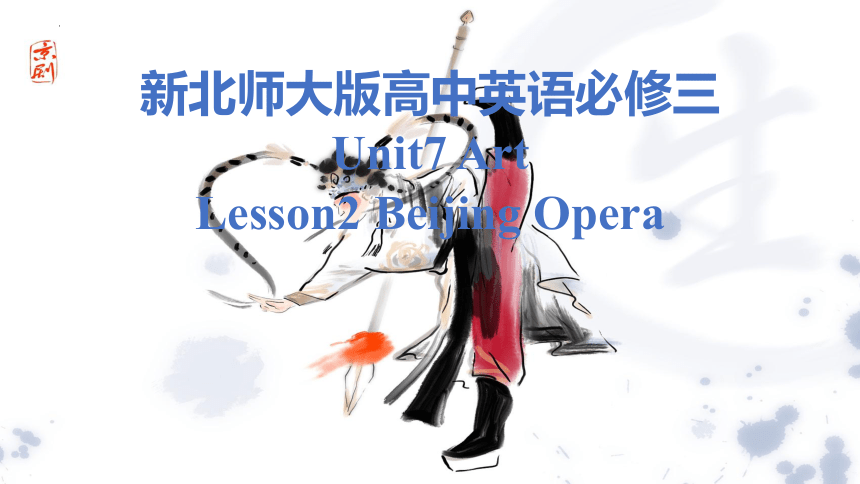
|
|
| 格式 | pptx | ||
| 文件大小 | 3.2MB | ||
| 资源类型 | 教案 | ||
| 版本资源 | 北师大版(2019) | ||
| 科目 | 英语 | ||
| 更新时间 | 2023-08-11 00:00:00 | ||
图片预览

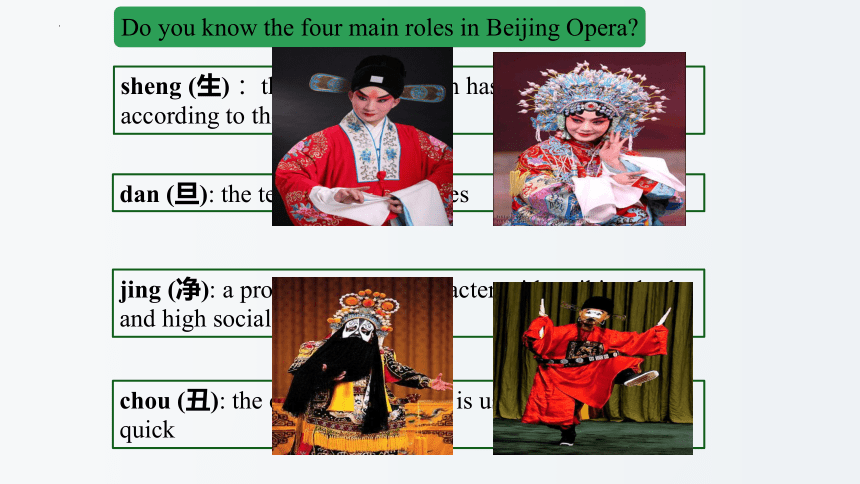
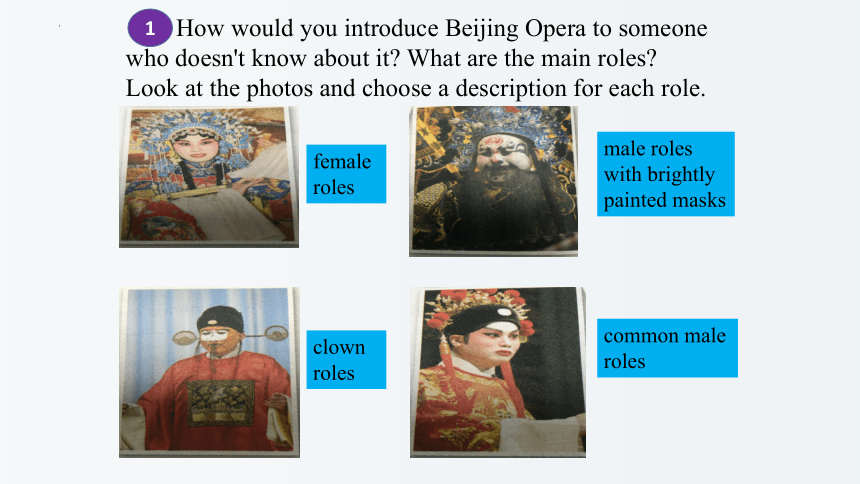
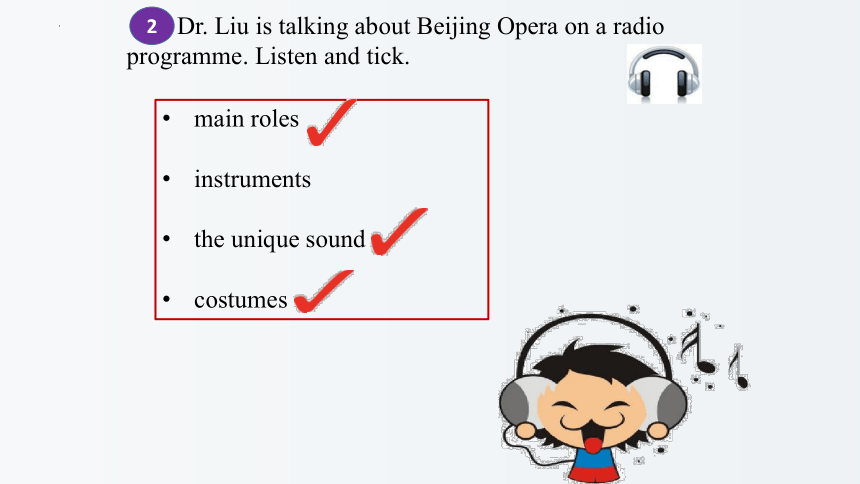
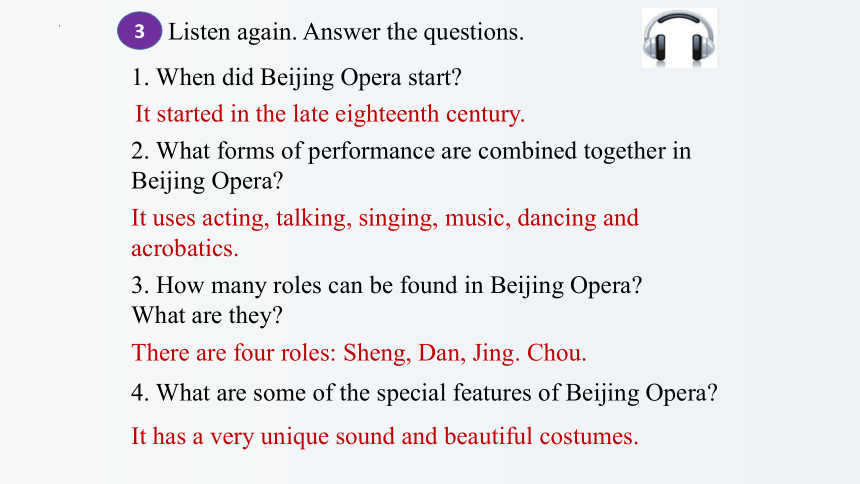

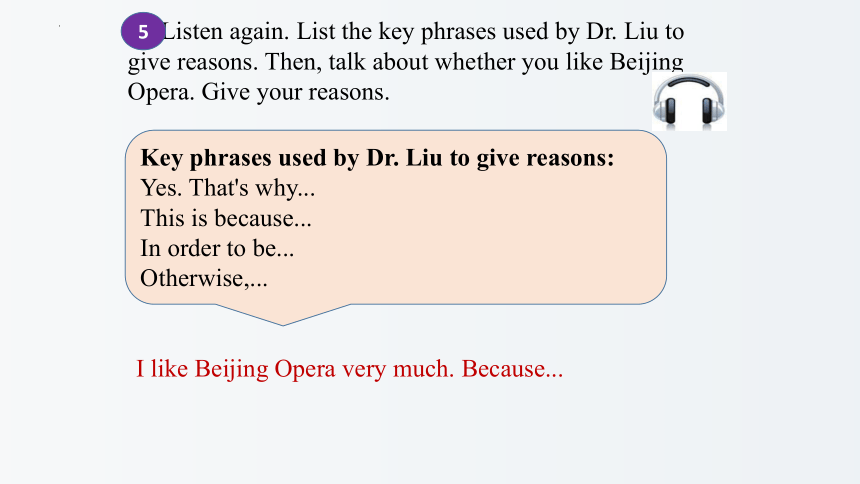
文档简介
(共19张PPT)
新北师大版高中英语必修三Unit7 Art
Lesson2 Beijing Opera
Do you know the four main roles in Beijing Opera
sheng (生) :the male role which has several subtypes according to the character's
dan (旦): the term for female roles
jing (净): a prominent male character with striking looks and high social position
chou (丑): the comedy role, who is usually active and quick
How would you introduce Beijing Opera to someone who doesn't know about it What are the main roles Look at the photos and choose a description for each role.
female roles
common male roles
clown roles
male roles with brightly painted masks
1
Dr. Liu is talking about Beijing Opera on a radio programme. Listen and tick.
2
main roles
instruments
the unique sound
costumes
Listen again. Answer the questions.
3
1. When did Beijing Opera start
2. What forms of performance are combined together in Beijing Opera
3. How many roles can be found in Beijing Opera What are they
4. What are some of the special features of Beijing Opera
It started in the late eighteenth century.
It uses acting, talking, singing, music, dancing and acrobatics.
There are four roles: Sheng, Dan, Jing. Chou.
It has a very unique sound and beautiful costumes.
Listen again and find the answers to these questions. Take notes.
4
1. Why is Beijing Opera a national treasure of China
2. Why do performers sing in very high voices
3. Why are the costumes in bright colours
Beijing Opera is a national treasure of China because it uses acting, talking, singing, music, dancing and acrobatics. All of those forms are difficult to master.
Performers sing with very high voices because in the early days, it was usually performed on opened-air stages. In order to be heard over the crowds, the music had to be loud and performers had to sing in very high voices.
Costumes are in bright colours because in the past, it was often performed on stages that were lit only by oil lamps. The costumes had to have bright and colourful patterns. Otherwise, it would have been difficult to attract the audience's attention.
Skill Builder
Understanding Logical Relationships
Logical relationships usually refer to the inner relationships between/among things, like between causes and effects.
While you are listening, listen for key words like why and because.
Take note of the reasons.
Listen again. List the key phrases used by Dr. Liu to give reasons. Then, talk about whether you like Beijing Opera. Give your reasons.
5
I like Beijing Opera very much. Because...
Key phrases used by Dr. Liu to give reasons:
Yes. That's why...
This is because...
In order to be...
Otherwise,...
Introduce Beijing Opera to a group of students from another country.
6
The following topics can be used to introduce Beijing Opera.
the four roles
costumes and masks
sound and singing
history
interesting features
Listen to a dialogue about Beijing Opera. Answer the questions.
1. Who went to see Beijing Opera
2. How did the person feel about it
3. What didn't the person understand
7
Lucy went to see Beijing Opera.
She felt that it was an excellent show.
She didn't understand the part where the main character walks across the stage with a flag on each side of her.
Listen and Imitate. What emotions do the speakers express Write satisfaction, worry or regret after the sentences in the Talk Builder.
8
Talk Builder
Expressing Emotions (2)
...so colourful and exciting! ( )
I'm so glad you enjoyed it. ( )
I was worried because... ( )
I loved the dancing and the acrobatics. ( )
The perfromers were so talented! ( )
But there were quite a few things I didn't understand. ( )
I wish I knew more about them. ( )
satisfaction
satisfaction
satisfaction
satisfaction
worry
regret
regret
P13 9
· Students need to take notes of the roles, costumes and masks, sound and singing, history and interesting features...
· Student A: a Chinese student, who understands
Beijing opera very well
Student B: a foreign student, who does not
understand the opera and asks
questions
9
Complete the summary with words according to the interview.
Dr Liu is an expert on Beijing Opera. In his talk, he introduces Beijing Opera, which started ______________________, is a form of Chinese opera combining acting, talking, singing, music, dancing and _________ together. In his opinion, the reason why Beijing Opera is one of China's _______________ is that it is difficult for people
to master any skill in it. There are ______ roles in Beijing Opera, which are sheng, dan, jing and chou. Each role has its own singing and acting style. Because Beijing Opera
was usually performed _______________ with only oil
lamps lit, performers had to sing _________________ and
wear costumes with _________________________ to attract the _________ attention.
in the late 18th century
on open-air stage
bright and colorful patterns
acrobatics
four
in very high voices
national treasures
audience's
10
Do you think it is necessary to protect and pass down our national treasure If so, what can we do
1. Can you make predictions before listening
2. Can you take notes about specific details and understand their logical relationship
3. Can you introduce Beijing Opera to others and express your own opinions on protecting the national treasure
Self-evaluation
各个击破
1. master: to learn a skill or a language so well that you have no difficulty with it
v. 掌握,精通
eg We are expected to master a second language.
我们应该掌握一门第二语言。
【拓展】
master n. 大师;主人;硕士
eg a work of art by a true master 一件真正的
大师的作品
2. refer to 提到,谈到;参考,查阅
【拓展】
1) refer sth. to... 把……提交给……
refer to sb. 指的是某人
refer to ... as 把……称为
2) reference n. 提及;谈到;参考;查阅
in/with reference to... 关于……
【语境应用】根据汉语提示补全下列句子。
1) If you don’t know what this means, _____________________ (去查字典).
语法填空
2) Please so not include covers. A list of __________ (refer) must be included. (2019 天津)
3) Who does “I” ___________ (指代) in the text (2019全国II卷)
refer to the dictionary
references
refer to
3. otherwise: used after an order or suggestion to show what the result will be if you do not follow that order or suggestion
adv. 否则;要不然
eg We must run, otherwise we’ll be too late.
【拓展】or otherwise 或其它情况,或相反
eg We’ll get there somehow, by boat or otherwise.
We don’t know if the attendance was voluntary or otherwise.
【语境应用】翻译下面句子。
1) My parents lent me the money. Otherwise, I couldn’t have afforded the trip.
2) Some are wise, and some are otherwise.
我父母借给我钱了。否则,我也承担不起旅行。
有些人聪明,有些人则不然。
新北师大版高中英语必修三Unit7 Art
Lesson2 Beijing Opera
Do you know the four main roles in Beijing Opera
sheng (生) :the male role which has several subtypes according to the character's
dan (旦): the term for female roles
jing (净): a prominent male character with striking looks and high social position
chou (丑): the comedy role, who is usually active and quick
How would you introduce Beijing Opera to someone who doesn't know about it What are the main roles Look at the photos and choose a description for each role.
female roles
common male roles
clown roles
male roles with brightly painted masks
1
Dr. Liu is talking about Beijing Opera on a radio programme. Listen and tick.
2
main roles
instruments
the unique sound
costumes
Listen again. Answer the questions.
3
1. When did Beijing Opera start
2. What forms of performance are combined together in Beijing Opera
3. How many roles can be found in Beijing Opera What are they
4. What are some of the special features of Beijing Opera
It started in the late eighteenth century.
It uses acting, talking, singing, music, dancing and acrobatics.
There are four roles: Sheng, Dan, Jing. Chou.
It has a very unique sound and beautiful costumes.
Listen again and find the answers to these questions. Take notes.
4
1. Why is Beijing Opera a national treasure of China
2. Why do performers sing in very high voices
3. Why are the costumes in bright colours
Beijing Opera is a national treasure of China because it uses acting, talking, singing, music, dancing and acrobatics. All of those forms are difficult to master.
Performers sing with very high voices because in the early days, it was usually performed on opened-air stages. In order to be heard over the crowds, the music had to be loud and performers had to sing in very high voices.
Costumes are in bright colours because in the past, it was often performed on stages that were lit only by oil lamps. The costumes had to have bright and colourful patterns. Otherwise, it would have been difficult to attract the audience's attention.
Skill Builder
Understanding Logical Relationships
Logical relationships usually refer to the inner relationships between/among things, like between causes and effects.
While you are listening, listen for key words like why and because.
Take note of the reasons.
Listen again. List the key phrases used by Dr. Liu to give reasons. Then, talk about whether you like Beijing Opera. Give your reasons.
5
I like Beijing Opera very much. Because...
Key phrases used by Dr. Liu to give reasons:
Yes. That's why...
This is because...
In order to be...
Otherwise,...
Introduce Beijing Opera to a group of students from another country.
6
The following topics can be used to introduce Beijing Opera.
the four roles
costumes and masks
sound and singing
history
interesting features
Listen to a dialogue about Beijing Opera. Answer the questions.
1. Who went to see Beijing Opera
2. How did the person feel about it
3. What didn't the person understand
7
Lucy went to see Beijing Opera.
She felt that it was an excellent show.
She didn't understand the part where the main character walks across the stage with a flag on each side of her.
Listen and Imitate. What emotions do the speakers express Write satisfaction, worry or regret after the sentences in the Talk Builder.
8
Talk Builder
Expressing Emotions (2)
...so colourful and exciting! ( )
I'm so glad you enjoyed it. ( )
I was worried because... ( )
I loved the dancing and the acrobatics. ( )
The perfromers were so talented! ( )
But there were quite a few things I didn't understand. ( )
I wish I knew more about them. ( )
satisfaction
satisfaction
satisfaction
satisfaction
worry
regret
regret
P13 9
· Students need to take notes of the roles, costumes and masks, sound and singing, history and interesting features...
· Student A: a Chinese student, who understands
Beijing opera very well
Student B: a foreign student, who does not
understand the opera and asks
questions
9
Complete the summary with words according to the interview.
Dr Liu is an expert on Beijing Opera. In his talk, he introduces Beijing Opera, which started ______________________, is a form of Chinese opera combining acting, talking, singing, music, dancing and _________ together. In his opinion, the reason why Beijing Opera is one of China's _______________ is that it is difficult for people
to master any skill in it. There are ______ roles in Beijing Opera, which are sheng, dan, jing and chou. Each role has its own singing and acting style. Because Beijing Opera
was usually performed _______________ with only oil
lamps lit, performers had to sing _________________ and
wear costumes with _________________________ to attract the _________ attention.
in the late 18th century
on open-air stage
bright and colorful patterns
acrobatics
four
in very high voices
national treasures
audience's
10
Do you think it is necessary to protect and pass down our national treasure If so, what can we do
1. Can you make predictions before listening
2. Can you take notes about specific details and understand their logical relationship
3. Can you introduce Beijing Opera to others and express your own opinions on protecting the national treasure
Self-evaluation
各个击破
1. master: to learn a skill or a language so well that you have no difficulty with it
v. 掌握,精通
eg We are expected to master a second language.
我们应该掌握一门第二语言。
【拓展】
master n. 大师;主人;硕士
eg a work of art by a true master 一件真正的
大师的作品
2. refer to 提到,谈到;参考,查阅
【拓展】
1) refer sth. to... 把……提交给……
refer to sb. 指的是某人
refer to ... as 把……称为
2) reference n. 提及;谈到;参考;查阅
in/with reference to... 关于……
【语境应用】根据汉语提示补全下列句子。
1) If you don’t know what this means, _____________________ (去查字典).
语法填空
2) Please so not include covers. A list of __________ (refer) must be included. (2019 天津)
3) Who does “I” ___________ (指代) in the text (2019全国II卷)
refer to the dictionary
references
refer to
3. otherwise: used after an order or suggestion to show what the result will be if you do not follow that order or suggestion
adv. 否则;要不然
eg We must run, otherwise we’ll be too late.
【拓展】or otherwise 或其它情况,或相反
eg We’ll get there somehow, by boat or otherwise.
We don’t know if the attendance was voluntary or otherwise.
【语境应用】翻译下面句子。
1) My parents lent me the money. Otherwise, I couldn’t have afforded the trip.
2) Some are wise, and some are otherwise.
我父母借给我钱了。否则,我也承担不起旅行。
有些人聪明,有些人则不然。
同课章节目录
- Unit 7 Art
- Lesson 1 Masterpieces
- Lesson 2 Beijing Opera
- Lesson 3 A Musical Genius
- Unit 8 Green living
- Lesson 1 Roots and Shoots
- Lesson 2 Greening the Desert
- Lesson 3 "White Bikes" on the Road
- Unit 9 Learning
- Lesson 1 Active Learning
- Lesson 2 Language Learning Tips
- Lesson 3 The Secrets of Your Memory
